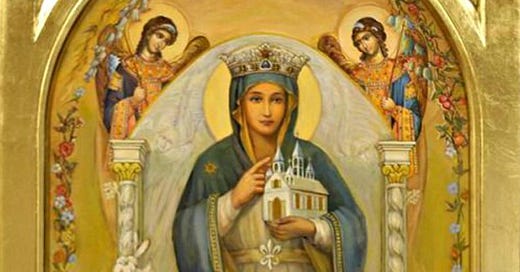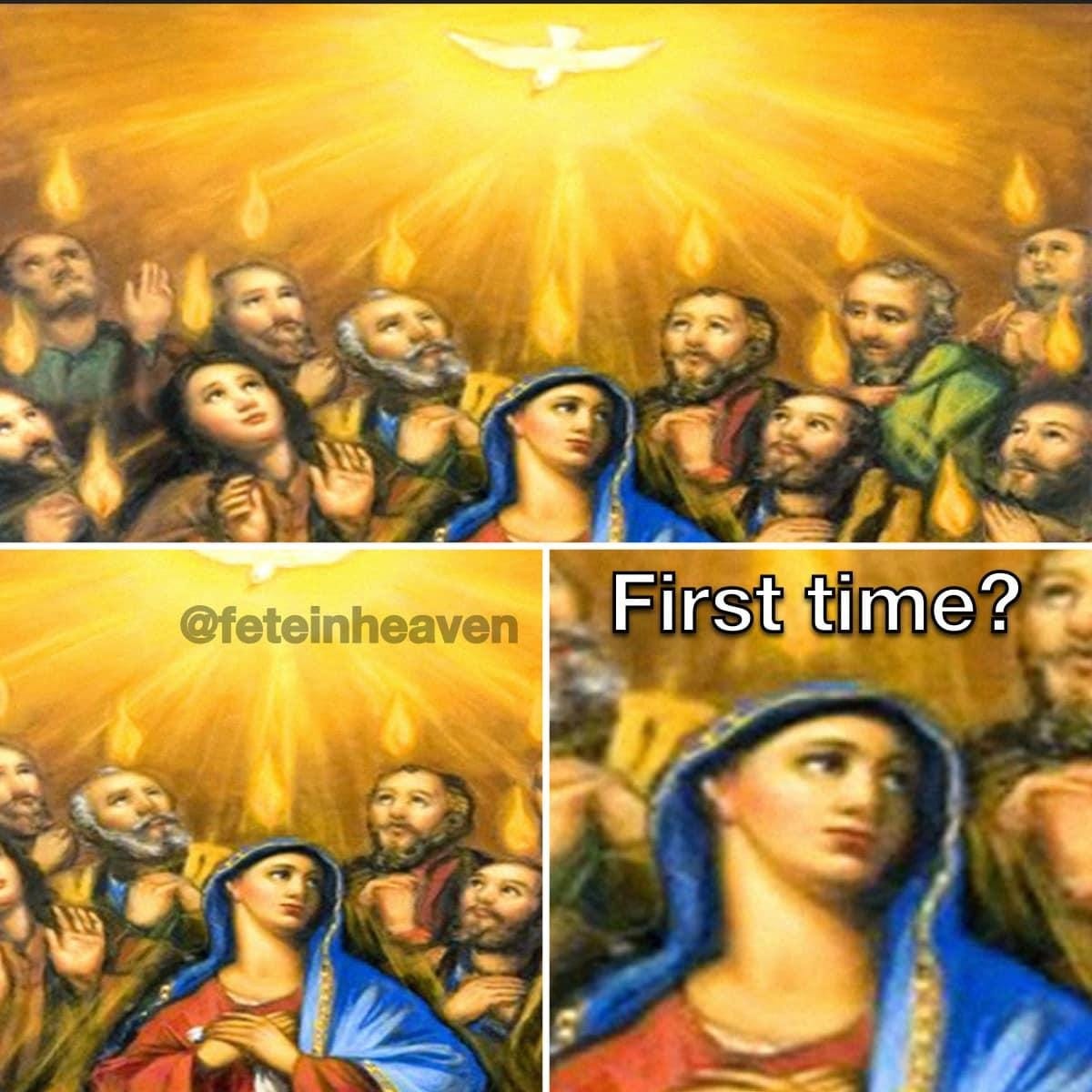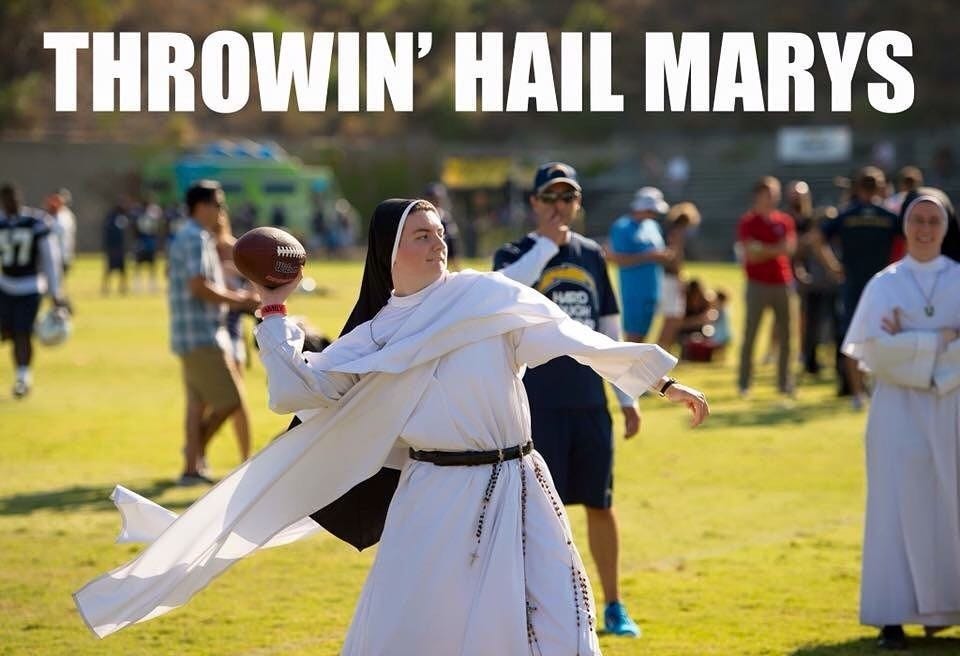Mary is naturally at the center of the nativity story, and the other narratives around Jesus’ childhood. She doesn’t get much mention until the Crucifixion, which would be, I imagine, the worst time of her life. No mother should have to see her child suffer and die.
But we shouldn’t forget she’s still there three days later, after the Resurrection. She was likely present for the Ascension, and was even in the room with the Apostles for Pentecost. The funny thing is, she was pretty used to talking with God and His messengers by that point…
Reading I
Acts 1:12-14
After Jesus had been taken up to heaven, the Apostles returned to Jerusalem from the mount called Olivet, which is near Jerusalem, a sabbath day’s journey away. When they entered the city they went to the upper room where they were staying, Peter and John and James and Andrew, Philip and Thomas, Bartholomew and Matthew, James son of Alphaeus, Simon the Zealot, and Judas son of James. All these devoted themselves with one accord to prayer, together with some women, and Mary the mother of Jesus, and his brothers.
This is considered the start of the very first Novena. The Apostles spent nine days in the upper room, praying with Mary herself.
When we pray a Novena today, it’s usually asking Mary to intercede for us, like she did for the couple at Cana. But we’re also praying with Mary, just like the Apostles.
She wants what’s best for us, like any good mother. And since “prayer” is just a fancy way of saying “talking with God,” she’ll happily join in with your prayer for anything that is good and holy.
Responsorial Psalm
Ps 87:1-2, 3 and 5, 6-7
R. Glorious things are told of you, O city of God.
His foundation upon the holy mountains
the LORD loves:
The gates of Zion,
more than any dwelling of Jacob.
R. Glorious things are told of you, O city of God.
Glorious things are said of you,
O city of God!
And of Zion they shall say:
“One and all were born in her;
And he who has established her
is the Most High LORD.”
R. Glorious things are told of you, O city of God.
They shall note, when the peoples are enrolled:
“This man was born there.”
And all shall sing, in their festive dance:
“My home is within you.”
R. Glorious things are told of you, O city of God.
This Psalm was written after the Babylonian exile. The Israelites considered their bond with Zion so strong that even exiles could claim citizenship without ever having been there.
And that’s what it’s like for the city of God, in Heaven. We’ve never been, yet we’re welcome to be citizens if we choose.
Alleluia
R. Alleluia, alleluia.
O happy Virgin, you gave birth to the Lord;
O blessed mother of the Church,
you warm our hearts with the Spirit of your Son Jesus Christ.
R. Alleluia, alleluia.
Mary was there at the birth of Christ and his Church. No one else can say that.
Gospel
Jn 19:25-34
Standing by the cross of Jesus were his mother and his mother’s sister, Mary the wife of Clopas, and Mary of Magdala. When Jesus saw his mother and the disciple there whom he loved, he said to his mother, “Woman, behold, your son.”
Then he said to the disciple, “Behold, your mother.” And from that hour the disciple took her into his home.
After this, aware that everything was now finished, in order that the Scripture might be fulfilled, Jesus said, “I thirst.”
There was a vessel filled with common wine. So they put a sponge soaked in wine on a sprig of hyssop and put it up to his mouth. When Jesus had taken the wine, he said, “It is finished.” And bowing his head, he handed over the spirit.
Now since it was preparation day, in order that the bodies might not remain on the cross on the sabbath, for the sabbath day of that week was a solemn one, the Jews asked Pilate that their legs be broken and they be taken down. So the soldiers came and broke the legs of the first and then of the other one who was crucified with Jesus. But when they came to Jesus and saw that he was already dead, they did not break his legs, but one soldier thrust his lance into his side, and immediately Blood and water flowed out.
If you’re wondering about the reference to Jesus’ “brothers” in the first reading, this pretty much blows that idea out of the water. The Greek word adelphoi can mean “brother” or just close relation.
But if Jesus had actual brothers, who were Mary’s sons, there would be no need for Jesus to instruct John to adopt her as his “mother.” He wants someone to take care of her in her old age; He trusts John, the beloved disciple, to do it.
None of that would be necessary if Mary had other sons. The scene makes no sense in that context. Instead, it’s necessary precisely because Jesus was an only child.
We can’t take care of Mary in the same way, naturally. She doesn’t need anything, strictly speaking. But we can still pay her homage that she rightly deserves. It’s like a kid making macaroni art for his mom. Yeah, she doesn’t need it. But she loves it anyway.






